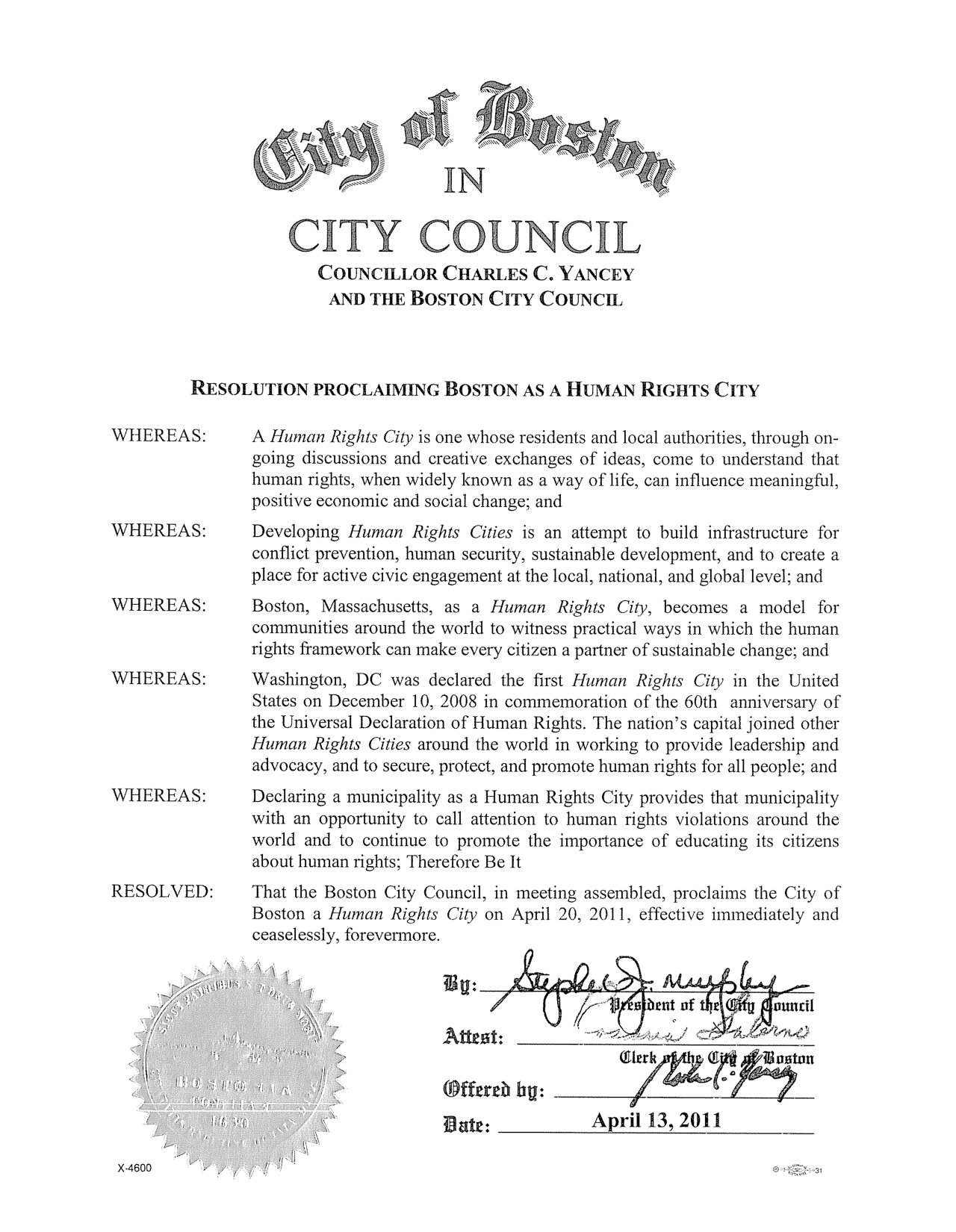
In case merry New England hasn’t quite drained the city-on-a-hill teat, this week the Boston City Council christened our fair metropolis a Human Rights City, to be “effective immediately and ceaselessly, forevermore” from April 20, 2011.
The brief resolution (pictured left) clarifies that a “human rights city” is one whose “residents and local authorities, through ongoing discussions and creative exchange of ideas, come to understand that human rights, when widely known as a way of life, can influence meaningful, positive economic and social change.” In so declaring, Boston “becomes a model for communities around the world” and assumes “an opportunity to call attention to human rights violations around the world and to continue to promote the importance of educating its citizens about human rights.” Boston joins fellow US human rights cities Washington, DC and Eugene, OR.
The pronouncement has garnered absolutely no attention in either local or national press, perhaps for good reason. As part of the Council’s consent agenda, the resolution was not read aloud or put to vote, but rather was acknowledged in the session’s closing minutes as a single item alongside twenty-odd congratulations of local heroes, precocious schoolchildren and the centenarian-of-the-week. The DC council calls fluff where it lies, distinguishing these symbolic gestures as “ceremonial resolutions.” As items on the Boston council’s consent agenda are removed solely upon the objection of a council member (and imagine the HuffPost crucifixion awaiting anyone daft enough to oppose a human rights resolution), Boston was ushered into its illustrious age of human rights with nary a second thought.
Granted, I don’t know the effort or lobbying that went into even this cursory homage — it could very well be that the Council gave considerable thought to the idea of local human rights enforcement, and that support was so unanimous as to render approval via the consent agenda the most expedient and appropriate avenue. But the dearth of media coverage or even a generic press release suggests otherwise. On the Council’s end, at least, this has all the hallmarks of being a politically costless move with zero intention of followup.
Looking at DC and Eugene and the (perhaps smallish) human rights city movement overall, though, one feels this might not particularly matter, since political leaders figure into the movement’s toolkit in precisely the symbolic and PR-centric role that the City Council has duly fulfilled. The motivating principle behind the human rights city is not top-down legislation, but rather education on the principles, content and mechanisms for human rights already in place in international and domestic law. Thus the onus remains on community organizers and activists to bring the vision of a human rights city to bear. This grassroots effort has attracted the interest of the UN Development Program and UN Habitat for its potential to take human rights out of parliamentary halls and high courts and into street-level implementation.
Perhaps, then, the Boston resolution portends beyond its lackluster beginnings, if it signals a broader push to bring a human rights approach to local education, poverty, income and health disparities. If nothing else, such a movement would bring (much-needed) dialogue as to what constitutes a human right, particularly with regard to the oft-overlooked economic and social rights our Congress and state legislatures continue to deride as mere “entitlements” worthy of axing. Let’s hope that the concept of locally-grounded human rights carries currency beyond being sandwiched between City Council shout-outs.


Hi Shawn,
Thanks for the only media coverage we have seen so far on the Human Rights City article ,Boston, The Human Rights Hub?
You can check out our website, survivorsinc.org for the story of how it came about.
We are having a meeting with Shula Koenig the author and originator of the concept of Human Rights Cities, on Saturday June4th at the Freedom House , 14 Crawford St. Dorchester, Ma. from 6 PM to 8 PM and you are invited to attend.
For more info you can call me at 617 298-7311
Thank you,
Dottie Stevens